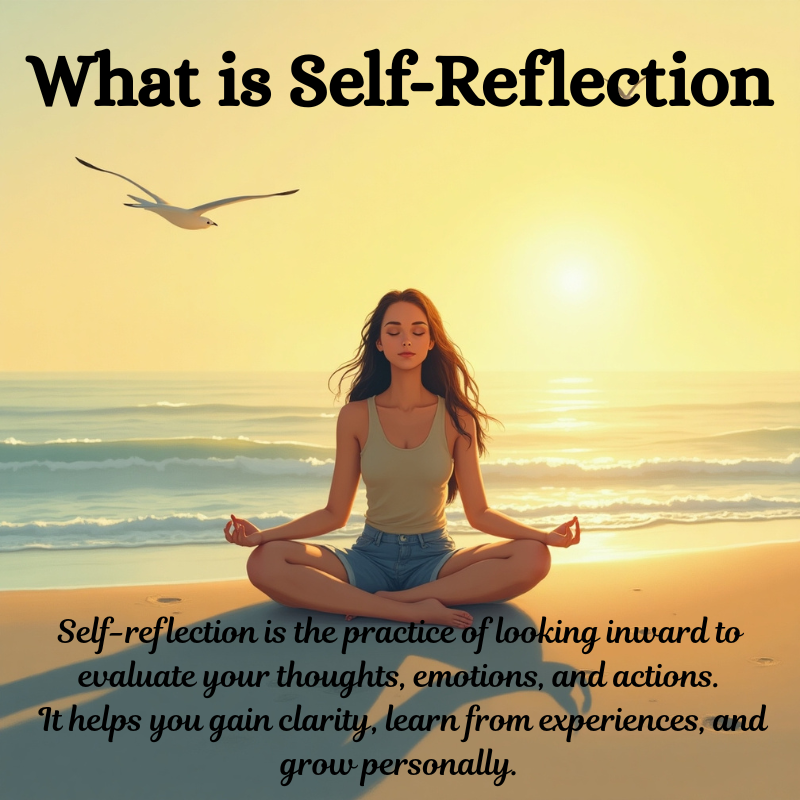Self-reflection is more than just thinking about your day; it’s an intentional process of looking inward to better understand your thoughts, emotions, and behaviors. In today’s fast-paced world, where distractions dominate, practices like yoga and mindfulness can enhance this process by creating space for clarity and calm. Taking time for self-reflection can be a game-changer for personal growth. But what makes it so powerful, and how can you practice it effectively in your daily life?
In this comprehensive guide, we’ll cover:
- What self-reflection really means
- Why it’s essential for personal growth
- Simple methods to incorporate it into your life
- Common challenges and how to overcome them
- Practical tips, FAQs, and expert insights
What is Self-Reflection?

Self-reflection is the practice of intentionally examining your thoughts, feelings, actions, and experiences to gain a deeper understanding of yourself. It’s about stepping back, observing without judgment, and identifying areas for growth.
Instead of living on autopilot, self-reflection allows you to pause and ask:
- Why did I react that way?
- What can I learn from this experience?
- How can I improve moving forward?
This simple act can lead to profound changes in mindset, behavior, and relationships.
The Importance of Self-Reflection in Personal Growth
Why is self-reflection so critical for personal development? Because it creates awareness—the first step toward change. Here’s why it matters:
1. Improves Self-Awareness
You can’t grow if you don’t know where you stand. Reflection reveals your strengths, weaknesses, and habits.
2. Enhances Decision-Making
When you understand your motives and patterns, you make better, more aligned choices.
3. Builds Emotional Intelligence
Self-reflection helps you recognize and regulate emotions, which strengthens relationships.
4. Reduces Stress and Anxiety
Taking time to process your feelings creates mental clarity and calmness.
5. Encourages Continuous Growth
By learning from past experiences, you avoid repeating mistakes and build resilience.
How to Practice Self-Reflection Effectively
Practicing self-reflection doesn’t require hours of meditation (though meditation helps!). Here are simple, actionable methods:
1. Journaling
Write down your thoughts, feelings, and key experiences daily. Use prompts like:
- “What am I grateful for today?”
- “What did I learn from today’s challenges?”
2. Mindful Meditation
Spend 10 minutes observing your thoughts without judgment. This builds awareness and presence.
3. Ask “Why” Questions
When something triggers you, ask:
- “Why did this affect me?”
- “What does this say about my values?”
4. Seek Feedback
Sometimes others notice what we don’t. Constructive feedback can provide powerful insights.
5. Digital Detox
Reduce screen time and social media scrolling. Quiet moments encourage deeper thinking.
Common Challenges in Self-Reflection and How to Overcome Them
1. Lack of Time
Solution: Start with 5 minutes a day. Even short sessions are impactful.
2. Fear of Facing the Truth
Solution: Remember, growth comes from honesty, not avoidance.
3. Overthinking vs. Reflecting
Solution: Stick to structured questions and journaling to avoid rumination.
4. Inconsistent Practice
Solution: Schedule it. Set reminders just like you would for a meeting.
Techniques to Deepen Self-Reflection
- Use Guided Prompts: Apps like Reflectly or Stoic provide structured reflections.
- Practice Gratitude: List 3 things daily you’re thankful for.
- Try Yoga or Mindfulness Practices: Physical awareness helps mental clarity.
- Walking Reflection: Take a quiet walk without distractions and think intentionally.
Benefits of Self-Reflection for Personal Growth
- Increased clarity about life goals
- Stronger emotional resilience
- Better relationships through empathy
- Improved mental health
- Greater confidence and self-trust
The Role of Self-Reflection in Professional Life
Personal growth impacts your career too. Reflection helps you:
- Identify strengths for promotions
- Improve communication with colleagues
- Manage workplace stress effectively
How Often Should You Reflect?
There’s no strict rule, but consistency matters. Options include:
- Daily: Quick journaling or mindfulness check-ins
- Weekly: Deeper review of goals and lessons
- Monthly: Evaluate long-term progress
FAQs About Self-Reflection and Personal Growth
1. How long should self-reflection take?
Even 5–10 minutes daily can make a big difference. Longer sessions (30–60 mins) weekly help for deeper analysis.
2. Can self-reflection reduce anxiety?
Yes. Processing emotions and thoughts reduces mental clutter and stress.
3. What tools can help with self-reflection?
Journals, meditation apps (Headspace, Calm), or guided prompts work best.
4. Is self-reflection the same as overthinking?
No. Overthinking spirals into worry, while reflection focuses on solutions and growth.
5. How can beginners start self-reflection?
Start small: ask yourself one question daily like, “What went well today?”
Final Thoughts
Personal growth through self-reflection isn’t about perfection; it’s about progress. By pausing, questioning, and learning, you gain control over your thoughts, actions, and future. Starting small 5 minutes a day can transform your mindset and unlock your true potential.
Self-reflection is a lifelong habit, and the more you practice, the more self-aware and empowered you become. Your best version is waiting to start today!
“Unlock your true potential—start your journey of personal growth through self-reflection today with https://mindscribes.com/!”

